#kingdom of gorre
Text
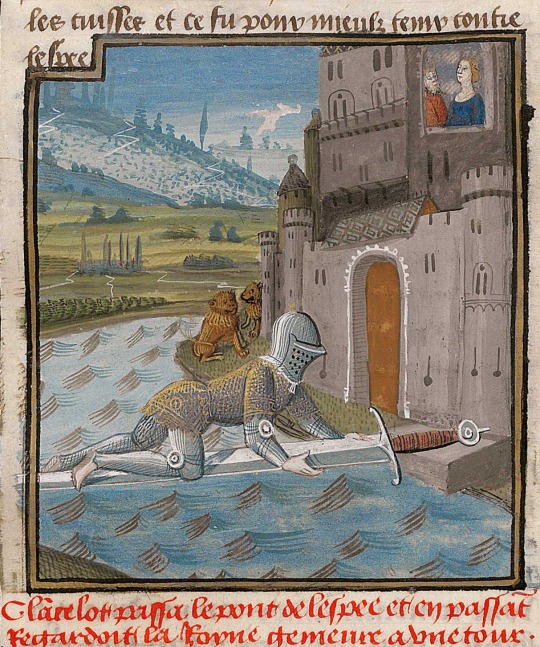
Lancelot crossing the Sword Bridge
Miniature illustration from a four-volume manuscript made for Jacques d'Armagnac, Duke of Nemours. Workshop of Évrard d'Espinques. Circa 1475.
#lancelot#launcelot#sir lancelot#arthurian#knight#knights#chivalry#chivalric romance#medieval#mediaeval#middle ages#chrétien de troyes#art#sword#bridge#guinevere#castle#camelot#meleagant#kingdom of gorre#illuminated manuscript#britain#france#mythology#queen#damsel in distress#realm#évrard d'espinques#jacques d'armagnac duke of nemours#europe
498 notes
·
View notes
Text
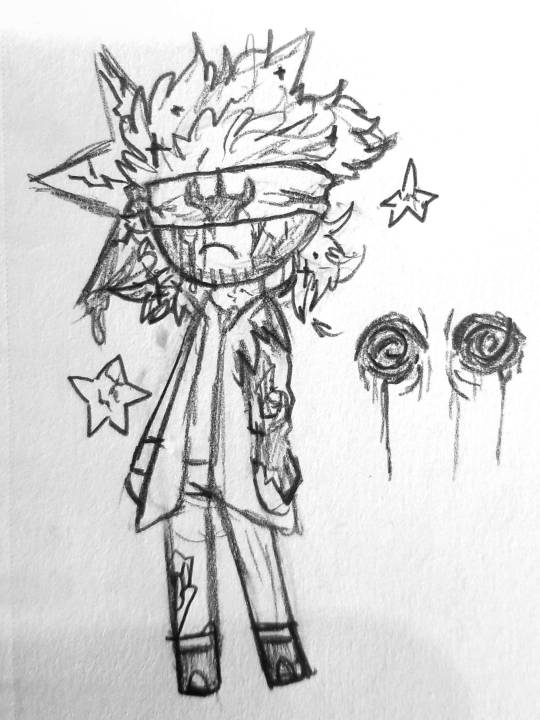
Remake of Shattered Star's ref
#benrey scritches#my oc#body horror#light gorr#cookie run#cookie run kingdom#crk#crob#cookie run oc#crk ocs#crk oc#oc shattered star
5 notes
·
View notes
Note
can we have a madame mim backstory.
Sure! Sorry it took a bit
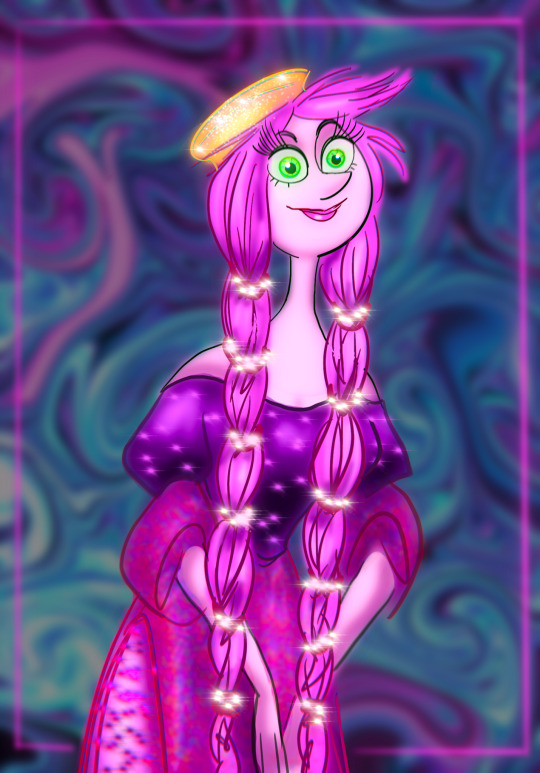
Mad Madam Mim was born Lady Miriam of Mousehole, a free spirited young woman who was tutored in the ways of witchcraft by her nannies, a trio of ladies from the land of Morva who absolutely falsified their good references to get the position, and may have been planning to eat baby Mim before she showed an early talent for magic and they decided to train her instead
Mim's great aptitude and appreciation for magic was countered by her having absolutely no inclination towards behaving as a proper lady should, she was always getting into mischief and dirt and declared she would rather be the one turning princes into frogs then kissing them
Despite this declaration she did end up eventually marrying King Bagdemagus, of the land of Gorre, who she was incredibly disappointed to find out was a quite polite and disgustingly normal man, and not an evil wizard as the name of his kingdom seemed to suggest
He was however very willing to let his mad wife run wild as long as she turned anyone important back from frogs at the end of the day which Mim appreciated, and together they had several daughters and a son, Maleagant, who with the witch Hellewise are the parents of Matilda "Mad Maddy"
Eventually Mim got bored of being Queen and giving her husband a peck on the head (she was a bird at the time) she flew the coop and settled down in the Forest Savage where she could be her prefered horrid hideous hag-like self
It was while living there she met Merlin and promptly decided her new favorite pastime was driving the fussy wizard to distraction, and they've been battling each other ever since
#asks#disneyverse#villain backstory#mad madam mim#the sword in the stone#the black cauldron#king arthur#the once and future king#Arthuriana#disney villains#canon descendants#disney descendants#mad maddy#Maleagant#hellewise#witches#merlin
64 notes
·
View notes
Text
The internal evidence agrees with these indications: the Charrette is far inferior to Chrétien's other work; the construction is feeble in the extreme, and bristles with contradictions and obscurities.
Why, for instance, does Meleagant suggest that Guinevere shall be put in charge of a knight and follow him?
Why not challenge a single combat at the court, where there would be a public to see that the rules of such combat were observed?
It may be that the original scene of abduction was a wood, and this is an awkward attempt to combine a later version, i.e. Arthur's court, with a primitive feature; but in any case it starts the story on wrong lines.
Gawain (who is also mounted) follows directly on Lancelot's track, but before he comes up with him there has been time for a fierce conflict to take place.
These conflicts with a valiant knight do not as a rule terminate so quickly, even though the odds be unequal! Gawain, who of course knows Lancelot well, apparently fails to recognise him, even when he unhelms for supper.
The maiden of the castle warns them against sleeping in a certain bed; whoever does so will scarce escape with his life.
Lancelot braves the adventure, but the next morning when he is found safe and well, the lady expresses no surprise.
We are told that the maiden whom Lancelot frees from the knight at the ford knows him and is afraid he will know her, but no explanation of this is vouchsafed, and her identity is not revealed.
We are expressly told that the kingdom of Gorres is surrounded by a water which none may pass, but before Lancelot even arrives at the water and bridge he is in the kingdom of Gorres, peopled by captive Bretons.
No explanation is given of how Guinevere knew of Lancelot's hesitation to mount the cart; there was no witness but the dwarf, and if he noted so momentary an indecision he must have had a curiously keen appreciation of the rules of Minne; and how did he come to see Guinevere?
But perhaps it was a case of telepathy.
In the same manner Kay becomes mysteriously aware of what has passed between Lancelot and the queen.
And these instances might be indefinitely multiplied. Chrétien's Lancelot is scarcely less incoherent than Ulrich von Zatzikhoven's; and we begin to wonder if there were not some inherent weakness in the legend itself, which rendered it impossible for any one to give an intelligible account of the hero's proceedings.
2 notes
·
View notes
Note
❛ what, am i not allowed to look at you? ❜ ( not sure if it's heart eyes or death eyes , but either way - from val )
“not when you’re looking at me LIKE THAT, no.”
since he’s returned to new asgard from the fight against the GOD BUTCHER, he has felt it— alongside the joy of the children being returned, the celebration of saving the gods of the universe, she exudes anger. thor can see it in her eyes whilst they pierce through him, how her smile grows TIGHT as her gaze lazily passes over him. allowing all to settle, not wanting to interrupt the happiness that falls over her kingdom, he has waited to confront it. now, alone, thor holds his head high, removes his teeth from his tongue. he is trying to ignore the NAGGING VOICE in the back of his head that claims, perhaps, she has a right to be agitated with him.
“there’d been no issue before i left to finish this. i stayed alive, just as you’d asked me to, and brought the children back to safety. gorr is dead. yet, you look at me not like somebody who is happy to see me, but like somebody who is BARELY RESISTING the impulse to hurl daggers at me. only me, might i add. why is it you are so upset with me, brun?”
#unvendaval (brunnhilde)#𝙜𝙤𝙙 𝙤𝙛 𝙩𝙝𝙪𝙣𝙙𝙚𝙧. main#as you can see i went with death eyes <3#idk what he did. but im sure shes right and hes wrong#he said brun and not val ooooo he’s serious#𝙜𝙤𝙙 𝙤𝙛 𝙩𝙝𝙪𝙣𝙙𝙚𝙧. queue
2 notes
·
View notes
Text
Was just struck by this part of Lancelot traveling through Gorre on his way to rescue Guenevere from Meleagant and meeting a bunch of exiles from Logres:
The young man was quite handsome, and his hair was cut in a way that exposed the whole of his fine, white neck; this was a sign that he was an exile [from Logres], because his hair was shaved and the people of Gorre wore braids.
— Lancelot Part IV, Chapter 109, Roberta L. Krueger translation
And like, it doesn’t REALLY work, because Lancelot has luscious long hair literally from jump, so he clearly doesn’t grow out his hair while in Wales, but he does spend 2+ years with Galehaut in Sorelois, (of which Gorre is a dependent kingdom) (both of them are in Wales) (ish) (insofar as I can glean anything at all about the geography of the Lancelot-grail), and I’m just thinking about Lancelot not assimilating to Logres hair norms over his entire life, but keeping his long hair and maybe thinking about his dead braided-hair boyfriend who died for the love of him.
4 notes
·
View notes
Text
youtube
Best of 2022 Movies #14: Thor Love and Thunder
For the first major Marvel hero to get a 4th outing, Thor certainly doesn’t let it go to waste.
Though Korg as a director tripled down on the humor which dilutes the product severely.

Still enjoyable to the least.
After adventuring with The Guardians of the Galaxy, (And giving themselves the means to buy Knowhere) Thor wonders who he is beyond his immortality.
That would soon come in the form of a one-two punch of an alien known as Gorr finding a cursed blade and going on a vengeance spree against all gods.
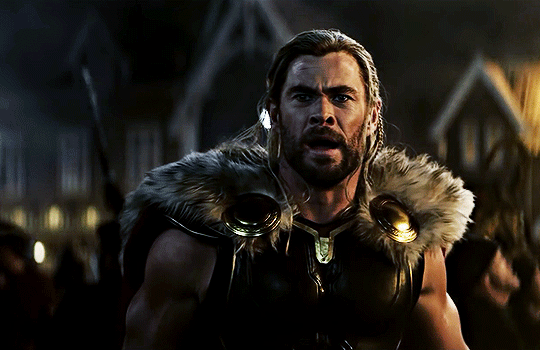
The second would be the return of his former girlfriend Jane Foster now afflicted with Cancer and after visiting New Asgard in Norway unexpectedly is given his former weapon and all its abilities turning her into Mighty Thor.

With the help of Valkyrie and Korg the group goes on a quest to rally against the butcher all the while keeping hope alive for the future of the kingdom.
Like said the humor is what severely damages this, if ragnarok worked cause of this, Taika got the hint to triple down.
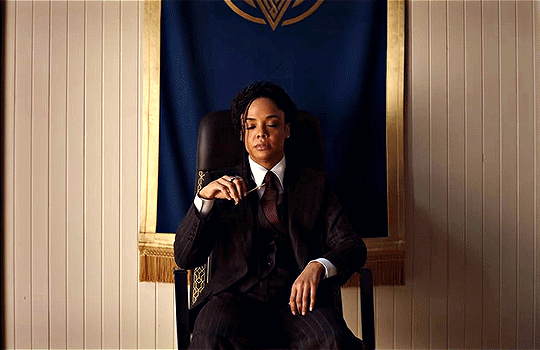
Russel Crowe wasted as Zeus especially.
But there are merits such as Natalie Portman knowing how to bring it in a new capacity.
And Even Christian Bale as Gorr, who along with one unexpected personal connection gives much needed depth.
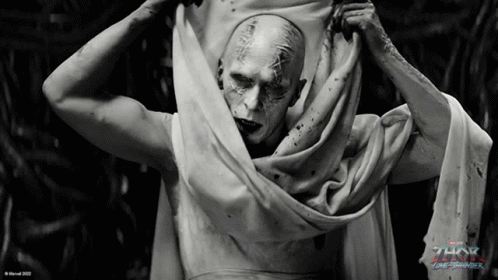
Not the 4th we needed but still good nonetheless.
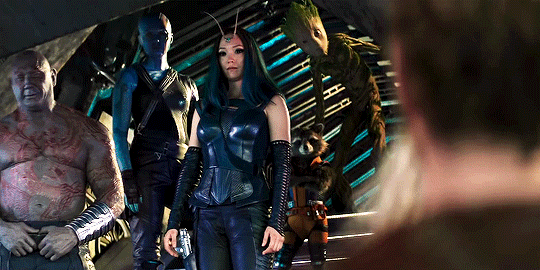
SUM 22: Thor, Jane, Valkyrie and Korg along with Screaming Goats truly prove that not every god (or director) has a plan.
#thor#thor odinson#love and thunder#chris hemsworth#natalie portman#mighty thor#eat my hammer#korg#taika waititi#tessa thompson#king valkyrie#axel himdalson#gorr the godkiller#christian bale#best of 2022#movies#14#best of 2022 movies#russel crowe#Zeus#Youtube#guardians of the galaxy#not every god has a plan#sweet child o mine#guns n roses#enya#screaming goats#Jane foster#india rose hemsworth
3 notes
·
View notes
Text
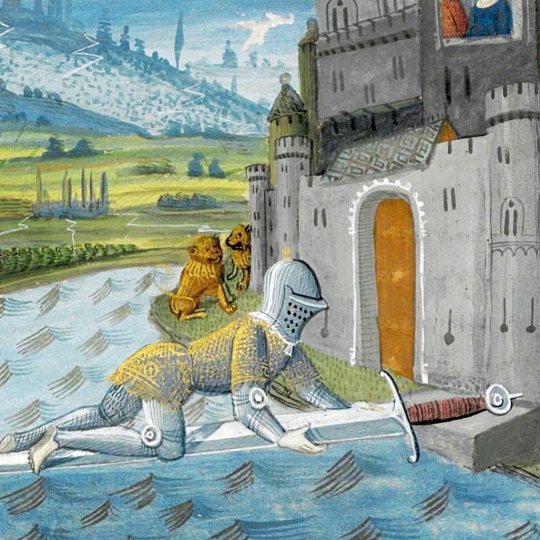
the chivalric hero Lancelot crossing the sword bridge to reach the kingdom of Gorre where the villain Meleagant has Queen Guinevere kept prisoner
0 notes
Text
INFO: Gods of the Reborn World
Found on theworld.alti/lore/gods
Centuries ago, the World was created by the Old Gods. Many of those old gods have died in war, but some still remained and even produced offspring to newer gods. Since then, they have remained quiet but present, their touch still felt within the World but rarely do they speak to their acolytes.
The Old Gods
Sol, the God of Creation - Eons ago Sol accidentally killed his brother Cernunnos during a quarrel. His lamentations of grief were what created the world. Eventually Sol would go on to create all of the other Gods and Goddesses, as well as the mortal races. Sol has long disappeared, feeling his purpose filled.
Aurora, Goddess of Light - (Lawful Good) Aurora was captured by the mortal races during the War against the Gods. They sealed her into a statue located in the Hulle Granz Cathedral and used her divine power as a fuel for the Crest Gun. Despite this, some believe she survived as the statue has disappeared from the Hulle Granz Cathedral, while others believe it’s a true sign of her death.
Folset, Alvinel, the God of Judgement - (Neutral Good) Folset guards the Morrigu Barrow Wall that blocks the Heavenly Path. It is said only those who are worthy can open these gates and enter the land of the gods, the City of Dawn Airceltrai. The Beast Statues scattered throughout The World are all of Folset.
Anu, the Goddess of Stars - (Chaotic Good) The City of Mac Anu is named after this Goddess. Anu is a Sumerian god of the stars, possessing the power to judge men. His stars would become soldiers to destroy the wicked.
Anomalis, the God of Steam & Invention - (Lawful Neutral) Son of Anu, Anomalis seeked only to bring the people of the World greater technology. So, he gave birth to creatures known as Chim Chims, whose energy could be used for technological innovations.
In the First Era, where many of the Gods were absent, the Cursed Wave appeared, a force created to destroy all life. While a party of heroes defeated them, in the Second Era they appeared again. Another group of heroes managed to control them to battle a greater threat and once their battle was complete, the Cursed Wave was to be a new pantheon called The Phases, otherwise known as The Deified Wave.
The Phases
Skeith, the Terror of Death - (Chaotic Neutral) Wielding a large red wand and with an ominous appearance, Skeith is the new God of Death after the murder of Cernunnos. Unlike Cernunnos, Skeith has been able to move between the Kingdom of the Dead and the Land of the Living with Sol’s disappearance, putting the Terror of Death into all living who appear before him.
Innis, the Mirage of Deceit - (Lawful Good) A trickster god that turned a new leaf when battling alongside its human compatriot in the Second Era. Now Innis, while keeping their original title as a cross to bear, has become a Goddess of Healing instead of their former form, the God of Deceit. They seek to be truly better after their deification.
Magus, the Propagation - (Lawful Neutral) The God of Procreation, Magus’ main concern is to ensure all of the races stay alive for the Eras to come, and procreate. Because of this specific focus, Magus sees life largely as numbers that need to be bolstered to stay alive through wars, disasters and diseases.
Fidchell, the Prophet - (Lawful Evil) The God of Fate & Prophecy. Fidchell’s deification has not changed it as much as one would hope. Still, Fidchell has its own code, and rarely causes issues for the other Phases. Most of its prophecies are those that lead to tragedy, and it will rarely step in to alter fate to assist anyone, only to harm those it deems necessary of harm.. Momento Mori is it’s favorite phrase.
Gorre, the Duality - (True Neutral) The most changed by its purification, Gorre was previously the Machinator. Now, Gorre is the God of Duality, somewhat similar to the greek god Janus. Its job is to keep balance in the world, such as with the fight between good and evil or the struggle between rich and poor. It’s literally of two heads, so it rarely is able to keep that balance between any of these concepts.
Macha, the Temptress - (Chaotic Good) The Goddess of Love and Sex. She works closely with Magus on occasions and sometimes chooses which mortals fall in love with each other. Macha, by merely existing, ensures that love and sex between mortals continues to happen. Once upon a time, this job was done by another God.
Tarvos, the Avenger - (Chaotic Evil) The God of Revenge and Jealousy. Tarvos is deeply obsessed with the feelings that make mortals lose control, that causes them to kill, and uses small touches to make mortals feed more more into these feelings.
Corbenik, the Rebirth - (Neutral Good) The God of Life and Rebirth. Corbenik is in charge of creating new souls and maintaining the Wheel of Reincarnation. Corbenik treats all souls as his children and often finds themself in conflict with Skeith, Gorre, Fidchell and Tarvos.
[A lot of the information from The Old Gods was copied directly from the .hack//wiki, this is mostly for use by my players but if anyone from the wiki is unhappy with it's use I'll remove it.]
0 notes
Text
Thor and Earth Knight: Love and Thunder
read it on the AO3 at https://ift.tt/vD0Amye
by The_Unlimited
Terra is pulled into a big surprise adventure when Thor ends up having to track down a mysterious person out killing gods. They soon return to New Asgard on Earth, where they regroup with the rest of the team, including Jane Foster, who suddenly wields Mjölnir. They all work together to set out and stop Gorr the God Butcher from fulfilling his quest, and saving all of the kidnapped Asgardian children along the way. Terra just wishes that Thor would man up and just tell Jane he still loves her, already...
Words: 17831, Chapters: 3/?, Language: English
Series: Part 20 of Light and Avengers
Fandoms: Kingdom Hearts (Video Games), Thor (Movies), Marvel Cinematic Universe
Rating: Teen And Up Audiences
Warnings: Creator Chose Not To Use Archive Warnings
Categories: F/M
Characters: Terra (Kingdom Hearts), Thor (Marvel), Jane Foster (Marvel), Aqua (Kingdom Hearts), Ventus (Kingdom Hearts), Brunnhilde | Valkyrie (Marvel), Korg of Krona, Gorr the God-Butcher, Sif (Marvel), Zeus (Marvel), Peter Quill, Nebula (Marvel), Drax the Destroyer, Mantis (Marvel), Rocket Raccoon, Groot (Marvel), Kraglin Obfonteri
Relationships: Aqua/Terra (Kingdom Hearts), Jane Foster/Thor, Aqua & Terra & Ventus (Kingdom Hearts), Brunnhilde | Valkyrie & Thor (Marvel), Korg of Krona & Thor, Sif & Thor (Marvel), Terra (Kingdom Hearts) & Thor (Marvel), Brunnhilde | Valkyrie & Jane Foster, Thor & Guardians Of The Galaxy Team, Terra (Kingdom Hearts) & Guardians Of The Galaxy Team
Additional Tags: Crossovers & Fandom Fusions, Add in of new character(s), Post-Kingdom Hearts: Melody of Memory, Pre-Kingdom Hearts IV, Angst and Humor, Timeline What Timeline
read it on the AO3 at https://ift.tt/vD0Amye
0 notes
Text
Thor and Earth Knight: Love and Thunder
read it on the AO3 at https://ift.tt/9CKV1dz
by The_Unlimited
Terra is pulled into a big surprise adventure when Thor ends up having to track down a mysterious person out killing gods. They soon return to New Asgard on Earth, where they regroup with the rest of the team, including Jane Foster, who suddenly wields Mjölnir. They all work together to set out and stop Gorr the God Butcher from fulfilling his quest, and saving all of the kidnapped Asgardian children along the way. Terra just wishes that Thor would man up and just tell Jane he still loves her, already...
Words: 4613, Chapters: 1/?, Language: English
Series: Part 20 of Light and Avengers
Fandoms: Kingdom Hearts (Video Games), Thor (Movies), Marvel Cinematic Universe
Rating: Teen And Up Audiences
Warnings: Creator Chose Not To Use Archive Warnings
Categories: F/M
Characters: Terra (Kingdom Hearts), Thor (Marvel), Jane Foster (Marvel), Aqua (Kingdom Hearts), Ventus (Kingdom Hearts), Brunnhilde | Valkyrie (Marvel), Korg of Krona, Gorr the God-Butcher, Sif (Marvel), Zeus (Marvel), Peter Quill, Nebula (Marvel), Drax the Destroyer, Mantis (Marvel), Rocket Raccoon, Groot (Marvel), Kraglin Obfonteri
Relationships: Aqua/Terra (Kingdom Hearts), Jane Foster/Thor, Aqua & Terra & Ventus (Kingdom Hearts), Brunnhilde | Valkyrie & Thor (Marvel), Korg of Krona & Thor, Sif & Thor (Marvel), Terra (Kingdom Hearts) & Thor (Marvel), Brunnhilde | Valkyrie & Jane Foster, Thor & Guardians Of The Galaxy Team, Terra (Kingdom Hearts) & Guardians Of The Galaxy Team
Additional Tags: Crossovers & Fandom Fusions, Add in of new character(s), Post-Kingdom Hearts: Melody of Memory, Pre-Kingdom Hearts IV, Angst and Humor, Timeline What Timeline
read it on the AO3 at https://ift.tt/9CKV1dz
0 notes
Text
It the light of recent events, I decided to rewrite/reword my old post about Maggie Stiefvater's use of Owain Glyndŵr.
Name
There are a few good posts about why using Glendower instead of Glyndŵr is a problem: X X
In short, using the anglicized name is not only furthering the easure of welsh language but also damaging welsh culture. The "Glendower" was created and first used by Shakespeare in "Henry IV, Part 1", were Glyndŵr was portrayed as "wild and exotic; a man who claims to be able to "call spirits from the vasty deep," ruled by magic and tradition" and a magician. (Not to mention the play was written as Tudor propaganda.)
Also, Owain Glyndŵr wasn't a king, but a prince.
Parentage
In The Dream Thieves (ch. 24), after pulling out a shield from the lake, we get this piece of information from Gansey:
"And it did seem like the sort of thing that would be brought along to bury with a king. He traced the ravens. Three ravens marked in a triangle — the coat of arms of Urien, Glendower’s mythological father."
The problem is it's not true, in any shape of form. Urien (or Urien Rheged) was a late 6th-century king of Rheged, an early British kingdom of the Hen Ogledd (today's northern England and southern Scotland), who in Arthurian legend became "King Urien of Gorre". He did have a son named Owain, namely Owain mab Urien, who isn't connected with Glyndŵr in anyway but name.
Owain mab Urien was the bases for the knight Ywain (Yvain/Ewain/Uwain) in Arthurian legend, best known from "Yvain, the Knight of the Lion" and "Owain, or the Lady of the Fountain".
Owain Glyndŵr 's real father was Gruffydd Fychan II.
Owain mad Urien and Owain Glyndŵr didn't even live in the same time period, with mab Urien died c. 595, while Glyndŵr lived c. 1359 - c. 1415.
Why Stiefvater merged them together is beyond my understanding.
Coat of arms and Ravens
As mention previously, the "three ravens marked in a triangle" is the coat of arms of Urien, and is not conected to Glydwr. Glydwr's coat of arms was two lions, he also had flag with a gold drangon (Y Ddraig Aur) and a banner with four lions.
Owain mab Urien/Ywian was connected to ravens in two more ways (that I could find): in "The Dream of Rhonabwy" the titular Rhonabwy has a dream were King Arthur has a game of gwyddbwyll with Owain, when "a messengers arrives declaring that Arthur's squires are attacking Owain's ravens"; and in "The Life of Saint Mungo" were is said he's a bastard son of Owain and princess Teneu, daughter of King Leudonus (Lot) who's attributed arms was a raven.
The only connection between Owain Glyndŵr and ravens I did find was, in some legends Glyndŵr was in possession of a "raven stone" which allowed him to became invisible. He could also communicated with birds.
I found no references of Glyndŵr being called "Raven King". (The only welsh figure referred to as it I could find was Brân the Blessed, but I'm not 100% sure about it. I also did find a polish legend about Raven King, which is kinda cool.)
Reality vs Legend
At it's with any other historical figure with cultural importance, legends grow around Glyndŵr. Like with King Arthur, who was a real people, are know this magical and mysterious figures of stories. Maggie throughout the whole Raven Cycle blurred the lines between what's are the real information and what was just a legend about Glyndŵr, which is understandable, it's a fantasy novel after all but what she did was fabricate information and passed them as true.
Another thing is removing Glyndŵr from Wales. Owain is a example of the motif "king asleep in the mountain/sleeping hero", a historical or legendary figure sleeping until with people need him. Owian is also a national hero of Wales. Removing him from his homeland and making him nothing more than a glorified genie for a group of American kids to find is disrespectful. Someone could argue, it was stated in the book, Glyndŵr 's followers moved him to America to protect his body from the enemies and he could as well return to Wales. But this was never a point in the story, him being a Wales prince wasn't important. What was, the characters want of the wish he could grant and Gansey's obsession of finding him.
Maggie's being related to Glyndŵr doesn't give her a pass on butchering Welsh culture. (From what I know, she's a American with German and Scottish roots.) Although she did her research (in a notebook she lost before writing TRC, from what I remember) and visited Wales, she's doesn't have a inside that a welsh person or a person who lives in Wales has.
Thank you for your time, and please, don’t be an assshole who sends anonymous complaints and vagueposting on their blog.
#maggie stiefvater#TRC#the raven cycle#anti maggie stiefvater#anti trc#anti raven cycle#Owen Glendower#owain glyndwr#Owain Glyndŵr
36 notes
·
View notes
Text
Arthurian Drabble
Just something I cooked up on fly. A short and simple piece about kingdom of Gorre and how they (didn’t) adapt to Morgana. Thanks for reading!
The castle of Gorre had no more inhabitants.
Once, it had been capital of Rheged, and as bustling and impressive and arrogant as any palace of any king in Britain (perhaps that was where trouble started, for had it been exceptional in any way, dreadful or sweet, maybe there could have been some compromise). King Uriens held his court, and there he quarelled and sang with his bannersmen, threatened and appeased them, rewarded and punished servants running it, listened and ignored his people, as is king’s right and due.
He wasn’t a bad man, but he was man so used to ordinary, that when his wife rolled in carriage and stepped out, refusing his hand and rolling her eyes, tsking as she walked with grace of bored cat, that he could do nothing but stare in bafflement after her. And perhaps he would have complained, or scolded her, if she didn’t take turn at corridor that wasn’t there yesterday, and took up residence in separate chambers that none could find without her permission, though they could walk for year and a day.
This summarized easily how Rheged took to their new queen, a plain woman with fine clothes her stepfather gave her and something frightful dwelling beyind her dead, apathic eyes. She refused to speak with even her sister when mood took her, and once four years had passed that nobody had seen her, though no carriage had set out, and each man in castle felt as if he lived under some great shadow. She didn’t shun her duties, not exactly- it was just that in most cases, baby’s cradle was rocked by mother, not by unseen hand. Things got done, for all that nobody could see how or when, for all queen refused to break bread with any human.
The servants were first to leave, one by one, spooked by meals that appeared on their own, and tasted as starved man imagines food to be, and by purple flames that filled hearts and torches and sometimes danced and led men away to swamps or their heart’s desire.
Courtiers and relatives were next, for they preferred their own homes, which, however small, could be guaranteed to be free of speaking mice, and that when you went out for five minutes you could expect tapestries to remain as they were, and not turn in wall of clinging vines and flowers that healed heartache.
Eventually, the town around it emptied, for people would rather live anywhere else but near castle that seemed to judge them for passing near it’s walls, and where air smelled of mystery and wonder more precious than health, and more fulfilling than happy and peaceful life.
And at last king packed his things and took away his son, for boy needed to grow up in normal place, and not one where shadows gossiped and each window showed to different land and weather. Yvain watched behind his back as they went away, and felt guilty that he was glad to be free from his ancestral home, and that he hoped to never lay eyes on it.
Yet he still gazed, as castle disappeared in fog, waiting for sillouethe of woman who never came out, denying him closure she didn’t need.
10 notes
·
View notes
Text
One fact about my arthurian story/novel is that it is hugely inaccurate to most sources. I took a bit from here and there and consciously decided to make only superficial research (though the research still continues). Why? I wanted to focus. I knew if I had too much source material I'd lose my mind -still happened. I wanted the freedom of knowing just the basics and trying to fill in the holes with my own ideas. This is why things like this happened:
-Lancelot grows up in Avalon, and is roughly the same age as Nimue/Viviane
-Anne/Morgause is Arthur's sister on Uther's side. She has another sister (therefore, Arthur's half sister). The role of Morgause is divided between the two sisters.
-No fighting between Arthur's kingdom and Gorre until very late in the story. And other screwing around with the timeline.
-The whole of Tristan and Iseult's story is changed.
-The whole freaking family tree is bullshit when compared to the mythical one.
-A bunch of OC's, but also a bunch of characters from the legends don't appear.
And so on. About 95% of these "inaccuracies" were made on purpose, and I dedicated the whole introduction to talk about the things I'd changed and why because I don't want people to think this is "true" in any way lol
#random fact about my writjng nobody cares about#but i still feel the need to justify it like i skipped very important things and introduced other's i'll need to rework so they make sense#but first revision hasnt even started so#blabla#writeblr#arthuriana#don#laura writes
19 notes
·
View notes
Text
Mordred’s Takeover
So... year's been unpleasant in numerous ways. And the election result did not go as I hoped. But in a vent-out of rage here is something I wrote. Needs work but it's a start.
Mordred was making another of his speeches to the crowd. “And I say it is the fault of those people! The Jews and Muslims, coming here, treating our country as if it were their own! The lords who are puppets of Luxemburg and its Emperor!”
To tell the truth before this Luxemburg had not been on the mind of most of the people in the crowd. But they heard these words and rejoiced at them. Being in a cheering crowd was such a wonderful feeling, you all felt together, believed you were part of something bigger.
“Heil Mordred! Heil Mordred!” cheered the hundreds, egged on by his men in the crowd.
Mordred left the stand and stalked into the hall where he was meeting the Saxon ambassador, a lord named Bunignus. Mordred was followed by his father-in-law Gwallanus. “My fool of a father has left the Kingdom with me” he said seating himself in a throne.
“But you cannot be King for now” said the Saxon ambasador. “You still need your father to not be King.”
“Yes…” said Mordred, his body twisting like a serpent in his stately seat. The thought of his father coming back from France… His fingers clenched.
Gwallanus stepped forward. “But… is that wise? Your father is old. A move to seize power might be a reason for disinheritance…”
Mordred stood up in fury. “I will not lose the throne! I will not be weak! It is time to show the Pendragon my strength!” He remembered what his mother had told him, of the wrong Arthur’s father did to his grandfather. Now was the time for revenge, on the whole Pendragon line, a revenge that would be known for a thousand years.
“This is for my family…” muttered Mordred. “Bring in my sons!”
In came Melehan and Melou, his sons by Cwyllog… who Mordred had not seen for years. Fortunate, she had not been producing more sons. And with her gone perhaps another could share Mordred’s bed…
“Melehan, my heir. Now is the time for us to take power! To revenge ourselves!” said Mordred.
“But aren’t we Pendragons?” asked Melehan.
Mordred moved forward furiously. “I am Gorlois’ grandson! You his great-grandson! We must avenge his murder by Arthur’s father!”
“But he’s our grandfather!” protested Melou. Mordred struck him across the face. “Do not deny this is our time!”
“Yes… of course father” said Melehan.
“But we must be wary now. Lies will be told against us. Plots, schemes. But it is all false! Our acts our justified!” Mordred remembered what Jarl Vidkun of Norway had told him. Adopt the tactics of Lucius. Talk of driving out the other. A show of strength. And that salute… he would try that as well.
“Go out! Tell the people of the Parliament! Show my strength!” he snarled.
“What strength?” asked Melehan.
“Gather a Parliament!” said Mordred. “Now! This is my moment!”
He produced a piece of paper and the royal seal. Then he took the piece of writing in which his father had named him steward of the Kingdom, with full rights.
Sir Enoch entered. “Sir Mordred!” he said, saluting. “I have the man.”
A prisoner entered. “A man from the cells of London, a forger of legal documents.”
“Write what I say” said Mordred. “In this writing.” He threw it down.
“What if I don’t?” asked the prisoner.
“If you succeed you will be given enough gold to live on the rest of your life. Fail and you die” snarled Mordred, though his eyes were gleaming with a frightening joy. It was unsettling and even Enoch edged towards the door.
The forger, a man named Alf, sighed, sat down and began to write very slowly. Mordred stood there watching him constantly. These were not pleasant eyes. At times Mordred had been charismatic, despite his unconventional appearance. But this was not the public Mordred but the private Mordred. Alf scratched out the signature slowly… for the second time, the first one had been difficult to do with those eyes boring into him.
A few days later a ship arrived and a messenger rode off, surrounded by guards, hastening to Westminster where Mordred sat. Mordred, not that eagerly, held out his hand for the letter. Reading it, an expression of exaggerated grief appeared on his face and he wept, holding his face.
“What is it, Sir Mordred?” asked a Baron.
“Here! Read this… but be careful!”
Mordred thrust the letter at him. The Baron read it and horror formed.
“Sir Enoch! Read it!” Mordred snatched the letter and held it out to the Knight, who took it and a moment later seemed to have finished it.
“The Parliament must know!” he said. “I’ll summon them!”
“Wolverhampton is with you” Enoch told Mordred. “I made one of my speeches. About the pollution of the Round Table, the blood that would be spilt if they continued with letting in other races.”
“That is excellent news” said Mordred, sipping his wine. He stood. “I have a title ready for you… if events go as I hope.”
It was days later. Mordred strode into the Parliament building, where people from all over Arthur’s Kingdom had gathered.
“My father, King Arthur Pendragon, son of Uther Pendragon… is dead.” Mordred waited for the gasps to die away. “As his only son I claim the throne.”
There was murmuring. What Mordred said was true… but the circumstances of his birth…
“My father named me heir in the letter.” Mordred produced it for all to see.
“May I see this letter?” asked one of the Knights. He looked over it. “That is the royal seal but Arthur’s…”
“It is real!” replied Mordred, snatching it with such force he nearly tore it.
“Could we compare it to more of Arthur’s writing?” asked another Knight.
Mordred turned his blazing eyes upon them. “Do you dare to question my words?”
“I merely wish to see if it…”
“A plot to subvert the will of our late King!” snarled Mordred. “Am I not his son? Does not the blood of Britain flow in my veins from both of my parents?”
“Heil Mordred!” cried Gwallanus from his place in the Parliament.
“Heil Mordred!” cried others who had met Mordred before, though at first their voices were few among the many. Yet the voices began to grow.
For the past few months Mordred had feasted the nobles. He had opened the vaults of his father, where they had stored wealth for their plans. A new hospital in London, improved roads, repairs to a bridge in Lincoln… but these were not important to Mordred.
And finally mutters began to be heard among the nobles, as Mordred had hoped there would be. “Why do we have to be ruled by Arthur?”
“Why do we have to pay more taxes when we don’t benefit?”
“Why can’t Arthur have more feasts for his nobles after all the work they do?”
“Why does Arthur give our money to the workers? He’s more peasant then King!”
“Mordred doesn’t hand out money to workers haphazardly.”
“Mordred doesn’t steal our wealth.”
And so, when Mordred said that Arthur was dead, even though news had not come elsewhere, and even merchants said they had not heard Arthur was dead… it was what much of the nobles wanted to hear. And not just nobles but people over Britain.
Gwallanus, eager to see his line hold the throne at last, was Mordred’s readiest supporter.
So it was that after a day of discussion the Parliament agreed that Mordred was the rightful King. Members of the Workers Party of Tor looked at each other in terror, knowing what this would mean. But alas, though they were against Mordred too many people favoured him.
Yet Mordred remained in his rooms writing out letters for outside Logres. After stamping an order for a forger to have his tongue cut out then be publicly executed he was writing for hours. To Jarl Vidkun in Norway, to Duke Chelric in Saxony, even to Lucius, to Eugenius III in Scotland, to Gunvasius in Orkney.
Jarl Vidkun had given Mordred many ideas from their meetings, of who to blame, of who to ally with. He had even shown Mordred that salute the Romans had performed, which Vidkun had learned from Lucius’ men.
Eugenius might not wish to show any submission to the rulers down south, but there was much Mordred could offer him. Perhaps an offer of greater autonomy. And Eugenius may well be a kindred spirit, considering the rumours about the death of his uncle. Of course Mordred found him personally pathetic, with his lack of desire towards any, he was hardly a proper man. But he could still be useful for the time being. Once Arthur was gone and Mordred secure… then relations between Logres and Scotland would certainly face renegotiation.
Gunvasius could be tricky, he had been opposed to Mordred’s stepfather King Lot ruling Orkney instead of him. But perhaps an offer to recognise him as King of Orkney...
“In Rome the younger Lucius rises” he said pleasantly. “I hope if Lancelot does not slay my father he will.”
“But what if he should claim Britain?” asked Enoch.
“And what of it? I will be King!” cried Mordred.
He turned and another thought struck him, of another detail written in the letter. “Guinevere will marry me” said Mordred, his eyes alight with lust. “As was ordered in the letter.”
“But… her age…” said Enoch.
“She was always sterile” said Mordred, with a smile. “But I have sons already.”
Not all accepted him. Lady Lisanor refused him. As did the Lords of Powys and Gwynned. But Mordred did not care. He had what he wanted. Those lands would fall to him in time. Even the land of Gorre and that whore Carys, daughter of that old fool Bagdemagus.
“Duke Chelric has long hated Arthur for his deeds. He opposed the Saxons for a long time, and his great-nephew slew the Duke’s nephew. He will jump at the chance of revenge” replied Mordred.
“But… he’s a Saxon! We are building Britain for the British!” said Sir Enoch.
Mordred smiled. “What does that matter? He will assist us. He will assist against our enemies.”
“And isn’t Cliges your nephew?”
Mordred spat. “That Greek? My whore sister should never have married that effeminate fool!” He smiled. “But he is far away from the reach of Saxony… and too far to help Arthur. I may be Arthur’s son… but I am not Arthur.”
He turned. “Now… to Guinevere. She must know of the wedding.”
Mordred left the chambers of the Queen. It had taken some time but she had given him a new place to go to, somewhere which should help his rule’s image.
It was not long after this that Mordred picked up the sword of his father’s father, named Clarent. It had been given to Guinevere for safekeeping and in order to prove her loyalty to him she had given its location to him. Not as fine as Excalibur but a magnificent sword, even if it was more for ceremony.
“I will prove whose grandson I am!” He wielded the sword. “I am Gorlois’ grandson! I will avenge the wrong on my grandmother!”
“So Guinevere has agreed?” asked Enoch.
“Not yet” said Mordred. “But I reminded her who holds power now. I reminded her of the letter. That if she did not go ahead with the law… events might not go well for her. Or her maids.” A horrible grimace of a smile played across his face. “Such beautiful vengeance… what better way to revenge the wrong upon the British King then to take his wife, just as the British King took the wife of Cornwall for his own.” He laughed, a horrible laugh, a laugh that seemed to go on, which made Enoch step back, especially with Mordred brandishing Clarent as if he were in battle.
Ares, nephew to Sir Tor, was meeting Mordred just before his coronation. If he could swing those beloved of the people to his side, Mordred was sure he would crush any further resistance. Ares had the name of his grandfather, a cowherd living around Derby. His older relatives had too much bad blood with Mordred but if he could win the next generation over… Yet from the start Ares did not show much interest.
“I have heard the King is alive” he said when Mordred entered.
“The King is alive as I am King.”
“No. I mean your father, Arthur. If he is then you are not King.”
“You dare to go against the will of the people! That I am King!”
“But you only took that power through blatant lies. How is it what the people want if you gained it through lies?”
“Well… it wasn’t a lie!” said Mordred. “It was true. It’s in the letter!”
“Well if it isn’t true then people will know eventually. You can’t hide the truth forever” said Ares.
“What do you know you cow… shit-cleaner!” Mordred spat at him.
Ares wiped his face. “I know if someone offered me 10 good cows and gave me 5 sickly cows it was not a fair deal. You are no better than a trickster!”
“It’s what the people want!”
“Then you tricked a lot of people. You and your gang of frauds, screaming and sowing hate.”
“You are just a pathetic little man from a family that cleaned up cowpats” said Mordred.
“So much for the man of the people! Though you traitors may sneer it doesn’t diminish my cause” said Ares.
Mordred glared at him. He moved forward slowly, his feet padding across the floor as he stalked forward like a beast of the wood. He held Ares’ gaze, breathed in and looked as if he was about to say something. And suddenly his hand shot to his dagger, pulling it out of the sheath and pouncing forward.
Ares dodged nimbly and grabbed a plate, hurling it against the false Knight. Mordred threw up his arms and shouted in pain as it crashed into his face, drawing blood. Ares got to the door and attempted to get out but Mordred was close behind. Ares kicked between his legs and elbowed him in the chest, though gave a shout at feeling armour beneath there. They wrestled, but Ares was younger and forced Mordred down.
“Help! Help! Treason!” screamed Mordred.
His guards rushed in and cut Ares down. Mordred furiously plunged his dagger in, again and again, even when Ares had stopped moving, and he lay there, like a butchered beasts of the field ravaged by a beast while the herd was away.
The guards stood there, not sure what to do as their ruler’s rage flowed out. Finally he stood, drenched in Ares’ blood, breathing hard. He threw his dagger down and glared down at the body of the cowherd. “He was a traitor! He attacked me! It was not me!” He spat blood down at Ares. “HE WAS A TRAITOR!”
Of course the next day proclamations were put up condemning the danger of these working-class parties, with a treasonous plot against the rightful King. Mordred made a speech before the Parliament. Once this was over he could finally go and marry Guinevere. She had asked to buy clothes and other items for her entourage for the wedding, so her retainers had been around London buying foods all day and yesterday. Once Mordred was crowned they could be wed, she who had once shared his father’s bed would share his… Mordred thought of this and excitement grew in him like a fire.
“It is clear that this… Cowherd movement is dangerous” said Mordred. “We will need stronger methods to counteract them. Bring a motion forward! It will be treason to question my rule. I am the Peoples ruler, any movement against me is against the people!”
And the rest of Ares grandsons watched in horror as a crowd gathered, chanting “Heil Mordred! Heil Mordred! Heil Mordred! HEIL MORDRED!”
@blackcur-rants @cukibola @epic-summaries @ylvisruinedmylife
9 notes
·
View notes
Note
For the meme - morgana and/or gwen, either from bbc merlin or the larger mythos lol
The Kingdom of Gorre is mostly cold, and wet. Guinevere gets used to seeing her breath fog before her and turning her face down as she hurries from out-building to castle, trying to save her paints and powders from the pissing rain. It is always raining, in the Kingdom of Gorre.
When she tells this to Arthur, he laughs, but it is a pained, abortive sound sound. “The things we endure for family,” he says at last, with an insincere smile. (Guinevere has been told of how the branches of the Pendragon family tree twist; still, it surprises her that Arthur will acknowledge it, even in so sideways a fashion. However much she loves and honors her husband, he is a bad liar, a worse politician; he fares better when he ignores such ugly truths entirely.)
Still—it suits, somehow. That the Kingdom of Gorre should be wet, grey as iron and cold as sea-washed silt. Guinevere knows that the marriage between Morgana and King Uriens is one of political expedience. For all the many weddings that begin in ignorance and fear before flowering to joy, there are those that curdle into bitterness instead. Despite Ywain, who is a handsome, happy child, the marriage of Morgana and Uriens is that.
Guinevere watches her at dinner, at dinner after dinner. Most of their visits to Arthur’s allies’ kingdoms feature dinner heavily. And there at dinner is Morgana, whom Guinevere’s people call le Fay—the witch, the fairy. They say being passed over for Arthur, the unhappiness of her marriage drove her to demonic arts and black magics, and other sorts of unspeakable things. They say that all Gorre’s strength came from Morgana’s art, though it folded before the sunlit Christ-anointed Arthur; there are rumors that Ywain was conceived by such profane arts, though Guinevere doubt that entirely.
(If one could have a child by swearing a pact with fairies or demons, Guinevere would not be in Gorre at all—she would be on bedrest in Camelot with her third, perhaps her fourth. She would be birthing Arthur’s children the way rabbits do: in litters of seven.)
All that being as it is: Guinevere watches Morgana.
Guinevere finds that she is dark, and slight, and there is nothing about her that might suggest she is more than a cunning woman placed at the unfortunate left hand of a king. A hnefatafl piece, moved about the board by her brother and husband. Guinevere finds she is almost sorrowful for it. She had been expecting le Fay, and there is only this girl, not so much older than Guinevere herself, who was bowed to others’ will.
The cup is passed around, again and again, to Arthur, to the knights of his kingdom and Uriens’, who lose themselves to stories, boasting of jousts, green (green! it makes Guinevere want to laugh) men who came to challenge their courage. Grails and questing beasts and wives, women, angels, all clad in samite and—
Guinevere startles at the touch of a hand at her wrist. “Queen of Camelot,” Morgana says, and so close, her eyes are dark as stone lashed by the rain of the Kingdom of Gorre. “My lady, my sister. Will you not drink?”
“You offer me the bowl?” Guinevere asks. It is an audacity, even so late in the evening—the men are drunk enough not to notice what passes among the women, but Guinevere is not, and neither are most of the ladies in the room. High-born and low, she can feel the wives, handmaids, harpists, serving girls, watching her, marking how she will respond.
“I do, my Queen,” Morgana says smoothly, presenting the ornate goblet to her. “If you like, you may tell me a tale of a woman in samite, to prove your worthiness.”
Guinevere smiles, despite herself. “I have no tales of women in samite.“
“Then perhaps you have cut off some unchivalrous man’s head,” Morgana says, and the corner of her mouth is ticked up, just slightly.
“Ah,” Guinevere says, with a regret she does not feel, “alas, no. I have only accepted head when it was offered freely.”
Morgana, called le Fay, laughs aloud at that. “My Queen,” she says, “my sister, my lady. For that alone, you must drink.”
Guinevere graciously accepts the goblet, watching the claret slosh in the cup. “Do you know,” she says absently, “it always rains here.”
“Yes,” Morgana answers in that same, placid tone. “Always. The king and the land are one, you know. And if the king is—well, sometimes the land chooses to be one with the queen instead.”
“I see,” Guinevere says, and lifts the goblet to her lips.
(Later that evening, Morgana will take the goblet and press her mouth to that same spot, where Guinevere’s painted lip left a smudge of color. She will recite incantations, and wear Guinevere’s skin, and then she will fuck Arthur in the bed meant for him to share with Guinevere. And Guinevere will hate Arthur, and hate—something else, bigger than any one of them, but she will never hate Morgana. Every time she tries, she thinks of that slim, dark girl; the witch, the fairy. She thinks of heads, bleeding on pikes. She thinks of the rain.)
#I refuse to go back to merlin bbc that is the place where the light doesn't touch#the elephant graveyard of the early 00s#arthurian legend#diiiiid I write this just so gwen and morgana could have chemistry and exchange ''giving head'' jokes#I mean it's not NOT that#katyliz415#this is a thing I made
141 notes
·
View notes